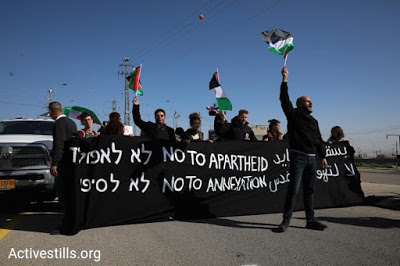‘No to Apartheid’: Palestinian activists blockade entrance to Israel’s new ‘Apartheid Road’
 |
| Yumna Patel – January 23, 2019 |
Over a dozen Palestinian activists, along with Israeli and international supporters, blockaded the entrance to Israel’s new ‘Apartheid Road’ in the central occupied West Bank district of Jerusalem on Wednesday morning.
The group of activists closed the gates to the newly opened road and formed a human chain, raising banners in Arabic, English, and Hebrew saying “No to Apartheid” and “No to Annexation.”

Israeli forces approach activists at the entrance to the ‘Apartheid Road’ on January 23, 2019 (Photo, PSCC Facebook)
Israeli forces arrived to the scene, which is located adjacent to an Israeli military base, shortly after the activists closed the road and attempted to forcibly remove them.
Two protesters were arrested and at least four others were injured. One of the detained protesters was identified as Ibrahim Musalem, from the southern West Bank city of Bethlehem.

Palestinian activist Ibrahim Musalem was arrested by Israeli forces (Photo: Munther Amira, Facebook)
Palestinian activist Munther Amira, who participated in the protest, said “any shame the [Israeli] Occupation may have had of its apartheid policies is now completely gone with this road. We must not and will not allow for their plan of ethnic cleansing in the outskirts of Jerusalem.”
Israeli authorities opened the ‘Apartheid Road’ or ‘Eastern Ring Road’ earlier this month to widespread Palestinian and international criticisms.
The four-lane highway features two separate road divided by a concrete wall – one for Israeli settlers and the other for Palestinians.
While the Israeli lane allows settlers quick and easy access to the center of Jerusalem, the Palestinian lane is designed to separate Palestinians off through an underpass, diverging to different areas of the West Bank.
In a statement regarding the protest, the Palestinian Popular Struggle Coordination Committee (PSCC) criticized Israel’s plans to expand the road to the south, saying it would “further entrench the two separate and unequal systems of transportation in the West Bank.”
The road is a key infrastructural part of implementing Israel’s ‘Greater Jerusalem’ or ‘E1’ plan, which seeks the de facto annexation of the three settlement blocs adjacent to Jerusalem city – Gush Etzion to the South, Ma’ale Adumim/E-1 to the east and Givat Ze’ev to the north.
If implemented, the southern West Bank would be completely cut off from the north, making a future contiguous Palestinian state nearly impossible.


